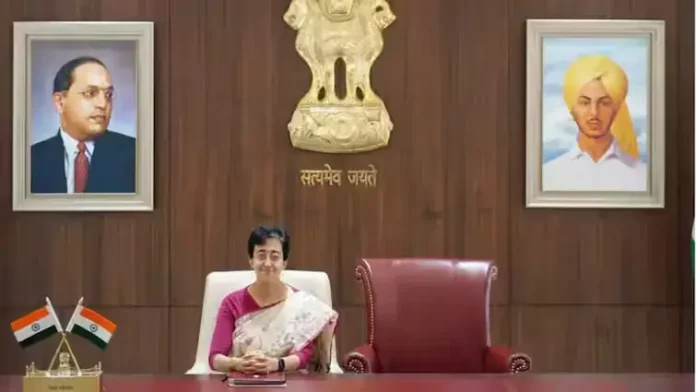In a significant political shift, Atishi became Delhi’s eighth chief minister on Monday, joining an elite group of women leaders who have held this position in the capital. Alongside Sheila Dikshit and Sushma Swaraj, Atishi is now the third woman to lead the city’s administration, marking a historic moment in Delhi’s political history.
Upon assuming office, Atishi made a symbolic gesture by placing an empty chair in the office, reserved for Arvind Kejriwal, the former chief minister and AAP National Convener. During her swearing-in ceremony, she declared, “This seat is for Arvind Kejriwal. I’m confident that Delhi’s residents will re-elect him as Chief Minister in the February elections. Until then, this chair will remain here, awaiting his return.”
This move underscored Atishi’s loyalty to Kejriwal and her belief that his absence is only temporary, driven by his legal entanglements. Kejriwal, a key figure in the Aam Aadmi Party (AAP), was arrested earlier in connection with the Delhi Excise Policy case, which has left a void in the city’s political leadership.
Atishi’s Temporary Role and Outlook for Elections
Atishi’s term as chief minister is expected to last only four months, as Delhi’s assembly elections are scheduled for February. She expressed optimism about Kejriwal’s return, stating that the people of Delhi would re-elect him for his contribution to governance and reforms in the city. Atishi credited Kejriwal for his dignity and ethics in politics, contrasting this with what she described as malicious attempts by the Bharatiya Janata Party (BJP) to tarnish his image through legal proceedings.
In a poignant comparison, Atishi likened her position to Bharat from the Indian epic Ramayana, who ruled in the absence of Lord Ram by placing his sandals on the throne. Atishi’s gesture of reserving the chair for Kejriwal draws on this cultural metaphor, reinforcing the notion that her leadership is temporary and symbolic of Kejriwal’s eventual return.
Governing with Multiple Portfolios
Atishi’s rise to the top post comes with significant responsibilities. She has retained her previous portfolios, overseeing 13 key departments, including Education, Finance, Power, and Water. Her role in education has been especially pivotal, as she is often credited for spearheading Delhi’s educational reforms, which transformed government schools and enhanced access to quality education for underprivileged children. Her continued involvement in this department signals that education remains a priority for the administration.
The remaining eight departments, including Health, Urban Development, and Social Welfare, will be managed by Saurabh Bharadwaj, another prominent leader within AAP. Gopal Rai continues to oversee Environment and two other departments, reflecting a team-based approach to governance during this transitional phase.
Meanwhile, Kailash Gehlot will lead four departments, including Transport and Women and Child Development, while Imran Hussain has been tasked with overseeing the Food Supply and Election departments. Newly inducted cabinet member Mukesh Ahlawat will manage five departments, including SC/ST Welfare and Labour.
This cabinet reshuffle aims to ensure that the day-to-day governance of Delhi is not disrupted during Kejriwal’s absence. However, the administration faces challenges as it takes charge after a period of political inactivity triggered by Kejriwal’s legal troubles.
Challenges Ahead for Atishi’s Administration
आज मैंने दिल्ली के मुख्यमंत्री की ज़िम्मेदारी सँभाली है। आज मेरे मन में वो ही व्यथा है जो भरत के मन में थी जब उनके बड़े भाई भगवान श्री राम 14 साल के वनवास पर गए थे, और भरत जी को अयोध्या का शासन सँभालना पड़ा था। जैसे भरत ने 14 साल भगवान श्री राम की खड़ाऊँ रख कर अयोध्या का शासन… pic.twitter.com/OkNEgtYIq4
— Atishi (@AtishiAAP) September 23, 2024
Atishi’s temporary administration inherits several unresolved issues. The excise policy controversy that ensnared Kejriwal and other AAP leaders continues to cast a shadow over the government. The controversy, revolving around alleged irregularities in the implementation of liquor policy, led to widespread public debates, legal investigations, and opposition backlash. Atishi will need to navigate these complexities while maintaining public trust in AAP’s governance.
Additionally, the Delhi government’s relations with the central government have often been strained, especially under the leadership of the BJP-led central administration. The issue of Delhi’s statehood and the limited power of the elected government in areas like law and order and land have remained contentious. As a temporary head of the government, Atishi’s role in mediating these tensions will be crucial in ensuring smooth governance.
On the development front, Atishi faces challenges such as ensuring the continuity of infrastructure projects, improving healthcare services, and addressing the pressing issues related to pollution and urban development. With the February elections looming, these areas are expected to be focal points of AAP’s campaign narrative.
Kejriwal’s Absence: A Pivotal Election Issue
The backdrop of Kejriwal’s detention and its impact on Delhi politics is likely to shape the narrative leading up to the assembly elections. Atishi’s handling of the government and her defense of Kejriwal will be closely scrutinized by both the public and the opposition. While the BJP continues to attack Kejriwal and AAP for their alleged involvement in corruption scandals, Atishi’s administration must demonstrate competence and ethical leadership to counter these claims.
The outcome of the elections will not only decide the future of Atishi’s role but also determine whether the Kejriwal-led AAP can maintain its stronghold in the city amid the political turbulence.
A Legacy in the Making?
Whether Atishi’s term will be remembered as a mere caretaker role or as a pivotal chapter in Delhi’s political evolution will depend on how she navigates the complex landscape of governance, politics, and public perception over the next few months. Her background as a scholar-turned-politician and her commitment to educational reforms suggest that she brings both intellectual depth and practical experience to the role, which could serve her well in addressing Delhi’s challenges.
As Delhi gears up for a heated election season, Atishi’s tenure will likely play a significant role in determining the political future of Arvind Kejriwal, the Aam Aadmi Party, and the city itself.


